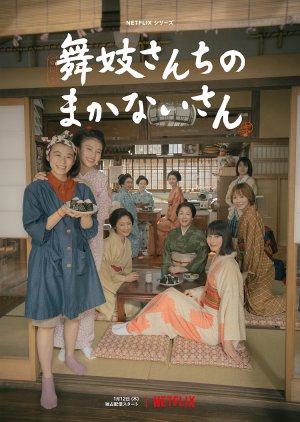
Good Enough
Jaqpanese Drama " Maiko-san Chino makanai-san" is a slice of life drama about friendship, love for cooking, and geisha traditions.The drama is cozy, sweet and homey. It has all the right feels to it, from being all about cooking and the joys of discovering new ingredients and caring for other, to having your life's dream being fullfilled. Also, the friendship between the girls was enjoyable, without many dramas, misunderstandings and unnecessary antagonism. The two girls were trully there for each other and trully happy for each others achievements.
The geisha traditions, moreover, were nicely portrayed. In addition, the drama showed the women's ambitions and sucrifices in order to become geisha.
The performances, finally, were all great from everyone in the series.
So, overall, 8.5 out of 10.
Questa recensione ti è stata utile?

Questa recensione può contenere spoiler
..ŌKINI~!!..
..my first reason I watch this drama is that one of the FL is a left handed beside Mayu Matsuoka (that I didn't recognize because of some changes on her hair, her makeup and her acting - very different)...
..this is one of a very relaxing to watch as I truly amazed how colorful the Kyoto is in terms of tradition..
.
..as the geisha / geiko is still alive and very professional act..
.
..the way the they move so graceful and the beat of the shamisen, it feels like I am on that room watching them that I don't want to miss any part of it - the eyes on their moves, the ears on the beats..
.
..the kimono, the makeup, the hairstyle, the accessories, everything are so colorful and very amazing..
.
..the drama also show different kind food that the casts sharing on the table with their stories to tell - indeed, food is more delicious when shared..
.
..just a mix of happiness and challenges in their respective lives are shown - the love of their profession which sacrifices to leave your loved ones to pursue on their dreams, to stand up on the path you chose..
.
..in the end, it teaches how you love one's talent and skill that you won't feel any regret or to give up (though there's a maiko ended it due to lack of her confident and maybe being envy), as long as it will give happiness to others then this will be serve as your happiness too to love yourself..
Questa recensione ti è stata utile?

This is an true slice-of-life Japanese drama, which is actually a certain type of story that Japan has developed over the years through formats like anime and manga where this type of story doesn’t necessarily have it’s origins there, but seems to be a very popular way of telling a story. And this drama is only nine episodes so time flies by while watching it.
The Makanai has a somewhat random storyline, although each character actually gets their own part of the narrative as they are followed through the day, but all the stories are a bit without a plot, or a big conflict that the character necessarily has to solve. It’s about the character and their life and dreams, but there’s no specific goal with the stories in particular. They just are. And in the end everyone gets together, people are friends and enjoys the food and their connection to the food that is served them.
The food in the series has its own meaning to the lives of the characters, whether it evokes memories or soothes them in some ways, gives them a warm hug and perhaps a little the importance of tradition, but also the conflicts that some traditions have with modern times. But this is always told without specific answers for the character. They are just there pondering these things while the narrative slowly passes us by.
This quiet narrative style isn’t for everyone, and many would without doubt want there to be more of a purpose to the story, or more tension and feel that our time with the characters doesn’t provide enough immersion. In general some might want or yearn for more story, but in my opinion this was just enough. The characters are all alive and doing their own thing. That cozy, easy-going feel is kind of the point of the story and this slice-of-life style of telling a story. It’s okay to just be cozy and enjoy good food in the hustle and bustle of everything.
Not everything needs tension. It doesn’t all have to be high-stake drama or action. And this sweet little story just lets you do take things easy and just be present, in a way. To be with these people, even if it’s just for a little bit. Not all TV content has to be big and bold. There is plenty of room for this kind of calmness too. The only downside that I can really point out about the shows is that it’s really impossible to watch these episodes without something to snack on, or stopping to google all these different recipes, because it’s all very appetizing and delicious to look at.
Questa recensione ti è stata utile?

A Charming, Cooking Slice-of-Life J-Drama
THE MAKANAI: COOKING FOR THE MAIKO HOUSE was a gorgeous, heartfelt JDrama series I recently stumbled across and it really left an impact. It was tender and sweet, with overall charming aesthetics, and very delicious meals prepared throughout as well. This felt like it went way above and beyond other similar Slice-of-Life cooking dramas I've seen, the quality itself makes it almost a new genre. It was very tastefully done and beautiful to watch.The sweet simplicity of this drama suprisingly draws you in, despite it being slower paced. The story was sweet, kinda slow-burn and yet still very captivating. The acting was really wonderful as well, so very organic and natural. The atmosphere in this series was very unique and hard to describe without making it sound dull, which it really wasn't! There is a very natural, genuine, calming, peaceful, gentle and sentimental ambience of this show. Loved the atmosphere. It really stands out as a chill Slice-of-Life series. Super refreshing.
Questa recensione ti è stata utile?
Questa recensione può contenere spoiler
Maybe I just like Koreeda...
I've found myself totally enamored with this show. It does a few things so right that it lets me overlook a lot of the "bad" parts to the extent that I've started to think "well, maybe it's actually fine the way it is?". I think if you, like me, love these parts then the show will mean a lot to you as well:1. As everyone has mentioned, the relationship between Sumire and Kiyo is lovely. It's occasionally over-acted for my western tastes, but the idea that you can have a friend who supports you as deeply as they do each other is a fantasy for many of us. Personally I've always struggled with the codependency that most romantic relationships entail, but Koreeda has depicted a truly wonderful alternative. Sumire and Kiyo are as close to partners as you can be platonically, but the communal living involved in 舞妓さんち forces them to interact and support those around them as well (after all, the makanai's job is to provide food for everyone). Communal living is a hot topic these days as loneliness and isolation increase dramatically (at least in America). Koreeda paints an *almost* utopian version of it.
2. "Almost" because we find that not everyone is happy despite the warm and cozy look we have into their lives. People find themselves feeling homesick or even losing motivation and quitting. But the whole thing is done in Koreeda's understated way. Like in real life, we never really understand how others feel. We only get a glimpse into why this fantasy world is insufficient for some and have to fill in the rest ourselves. To me, this is so much more satisfying and *real* than the vast majority of in-your-face jdrama scripts.
Watching Sumire deal with her "love triangle" in a quiet and subtle way felt all too familiar to me. One of my favorite moments--finding out from Sumire that Kenta was awestruck by a Geiko when they visited Kyoto on a school trip and the implication that perhaps that's at least part of the reason she became so interested in it. Something that I would miss in real life, presented the exact same in this drama. And, finally, the episode detailing her relationship with her father was beautiful. We don't know exactly what's going on in her homelife. It doesn't feel like abuse nor total negligence. But just enough disconnection so as to feel relatable to any teenager (though in this case they actually manage to move away at 16!), while simultaneously still holding onto the desire to seek one's parent's approval.
3. Finally, if you like learning about Japanese culture, Makanai is rich. It's clear that one of their goals was to teach us about maiko/geiko culture. We're naturally exposed to how difficult it is to sleep without ruining their made-up hair, to life without cellphones as a maiko, and to how apprentices are basically personal attendants to their mentor geikos. It's not entirely clear to me that these are all "real" but they at least felt real and believable to me (and, FWIW, I was introduced to the show by a native japanese who knows a lot about this world, so it's probably at least not wildly inaccurate?)
To that last point, I'll admit these flaws exist but also cover why they don't bother me very much:
1. For a lot of people, the reality that both alcohol and super old men with super young women/girls being core to the work is inherently gross. I do think bad stuff happens. But my impression is that it is at least not "normal". I think it's okay for this to not be a full/balanced documentary as long as I'm aware that it is perhaps, one-sided. The same could be said for almost any wholesome drama, I imagine.
2. I didn't love Nana Mori's (Kiyo) performance here, nor Makita Aju's (Ryoko). I understand Kiyo is supposed to not be as physically capable as the others, but a couple episodes in I was wondering if she had like a mental and/or physical disability. It's *so* exaggerated at points (and then, thankfully, disappears at other points). I think if she just toned things down it would've been so much more powerful (props, again, to Natsuki Deguchi (Sumire) for doing exactly that). The script here makes up for it though--the small scenes she has with everyone (esp. with Momoko and, separately, with Tsurukoma) end up being powerful just because they portray so perfectly what a moment of listening and empathy can look like even with people we aren't that close with.
As other's have mentioned, Ryoko's story seems to not have a satisfying ending. In general, I had a hard time sympathizing with her despite her having a legit reason to be angsty (i.e. growing up without a dad). I wonder if this is a lost in translation thing, but she honestly felt more like a weirdo than a bully (... why is she eavesdropping in sitting in random places all the time?). And when she sort of repairs things with her mom it just felt... fine? Good? I'm glad for her, I guess. There was no particular reason for me to care about her/nothing likeable about her IMO. I feel like a few scenes to showcase her hobbies/interests would've been enough. Though, on second viewing, we do get a glimpse into stuff like when she talks about her latest "bias" (i.e. kpop idol crush) with a couple characters, so perhaps my feelings will change here.
Lastly, while there are a lot of threads that are loose (e.g. what happens with Yoshino and her husband? Why didn't they want Yoshino in the house, anyways? What about Kenta/Kiyo/Sumire? etc) I think I almost like the show that much more for it. Obviously I'd love a second season, but I see the show as a glimpse into their lives. A glimpse which feels all the more authentic when we don't see the things leading up to their leaving Aomori nor the resolution to the stories we've become deeply invested in. Or, as they say in the show, an 一期一会.
Questa recensione ti è stata utile?

Pretty but lifeless and sentimental
I know Koreeda is a critically acclaimed filmmaker but after watching his film The Broker and this drama I have to conclude he's not for me. Both The Broker and Maiko-san Chi no Makanai-san are beautiful to look at and address a potentially compelling topic (baby trafficking and modern day geishas). But the writing is shallow and unrealistically sentimental.I'm with Samire's father: I would not want my minor daughter to drop out of school and pursue a profession that puts her in close contact with drunken businessmen every night. There's no way a beautiful young woman wouldn't be sexually harassed or worse in such a situation. But this drama glosses over any potentially ugly aspects of the profession in favor of endless scenes of the girls chatting and eating. No one disagrees about anything important (the biggest conflict is over who ate someone's pudding from the refrigerator) and there's no plot. The drama briefly alludes to the limited prospects available to women who leave the profession (it seems like the best retirement strategy is to marry a man who can financially support you or spend the rest of your life as a house mother to new geisha trainees), but it never builds to anything interesting.
I spent two days in Kyoto this year near the Gion district where this drama was filmed and it was nice to see the familiar streets, temples and parks (though I find it funny you don't see anyone sweating when Kyoto is a sweltering furnace in the summer with 90% humidity). The cooking scenes are aesthetically pleasing and the dishes are the kind of home foods you can find at a good Japanese family restaurant so if you live in a big city you can likely try most of the dishes. Additional beauty is provided by the hair, makeup and kimonos worn by the geishas.
I think probably the best way to view this drama is as beautiful wallpaper and nothing more.
Questa recensione ti è stata utile?







































